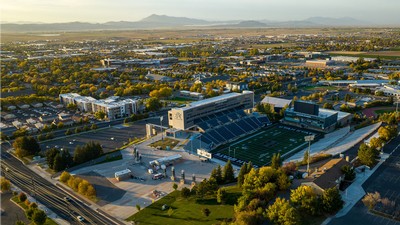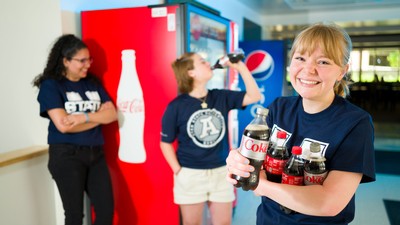Three USU Professors Earn Prestigious Awards
Three professors in the College of Agriculture and Applied Sciences (CAAS) recently won prestigious awards.
Kerry Rood — Animal, Dairy and Veterinary Sciences
The Utah Veterinary Medical Association recognized Kerry Rood, an associate professor in the Department of Animal, Dairy and Veterinary Sciences, as Veterinarian of the Year. Rood has been a member of the association for 15 years and said it was a complete surprise.
“It is quite an honor to be nominated by my peers as veterinarian of the year,” Rood said. “I don’t have the words to express how that makes me feel.”
Currently, Rood is working with Utah dairy farmers to help improve efficiency and increase productivity while also working with beef producers to help them better understand bovine viral diarrhea disease and its treatments. Additionally, Rood is working with cattlemen to find a more cost effective way to run a “trich” test, a test meant to help prevent the transmission of trichomoniasis from a bull to a cow during breeding. Once transmitted, the disease can cause a cow to abort her calf and can be passed onto other bulls.
Korry Hintze — Nutrition, Dietetics and Food Sciences
CAAS faculty member, Korry Hintze, earned his noteworthy award at the Sackler Institute of Nutrition Symposium in Manhattan.
“It felt great and was unexpected because there was so much good science being presented,” Hintze said.
Hintze, an associate professor in the Department of Nutrition, Dietetics and Food Sciences, was awarded an Early Career Investigator Poster Presentation prize for his presentation illustrating a simplified method he developed with other faculty members to “humanize” a non-germ free mouse gut, or a mouse that hasn’t had all microorganisms removed from its digestive tract for its use in scientific research.
“Basically, we replaced the resident bacteria in the mouse gut with human bacteria,” Hintze said. “This has been done before with germ-free mice but very few germ-free mice facilities exist so it has always been very difficult to humanize mice. Our process makes this process feasible for many more investigators and also is not limited to mice.”
Hintze said they are now using this model to study human diseases such as colon cancer and metabolic syndrome.
The institute is the nutrition science section for the New York Academy of Science, an organization that boasts several significant former members, including Thomas Jefferson, James Monroe, Alexander Graham Bell, Thomas Edison, Louis Pasteur, Charles Darwin, Margaret Mead and Albert Einstein.
Paul Jakus — Applied Economics
The Northeastern Agricultural and Resource Economics Association awarded Department of Applied Economics professor Paul Jakus an Agricultural and Resource Economics Review Fellows award.
The ARER Fellows award is given to authors who have published five or more peer-reviewed articles in Agricultural and Resource Economics Review and “who have demonstrated sustained excellence in research and commitment to the association’s journal,” according to the journal’s website.
“I am honored to have been named an ARER Fellow,” Jakus said. “I have always looked forward to receiving and reading the journal, because there is usually a research paper that can be used immediately in my own research program.”
Jakus is currently finishing two projects for the state of Utah. The first is a collaborative project between Jakus and colleagues from the Utah Division of Water Quality, Colorado State University, University of Wyoming and the consulting firm CH2M Hill to develop a model of water-based recreation. The model will allow those involved to see how recreational water activities change as water quality improves. The second project involves the Utah Division of Wildlife Resources and APEC assistant professor Man-Kuen Kim and aims to estimate the economic benefits of designated Blue Ribbon fisheries in Utah.
Jakus is also working with Therese Grijalva from Weber State University to collect data for the construction of models to test the hypothesis that the state of Utah can manage its public lands more effectively than the federal government.
Related links:
- Department of Animal, Dairy and Veterinary Sciences
- Department of Nutrition, Dietetics and Food Sciences
- Department of Applied Economics
- USU College of Agriculture and Applied Sciences
Contacts: Kerry Rood, 435-797-1882, kerry.rood@usu.edu; Korry Hintze, korry.hintze@usu.edu; Paul Jakus, 435-797-2309, paul.jakus@usu.edu
Comments and questions regarding this article may be directed to the contact person listed on this page.








